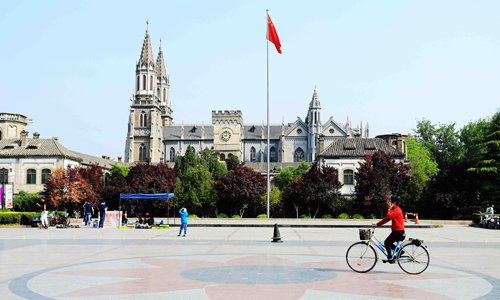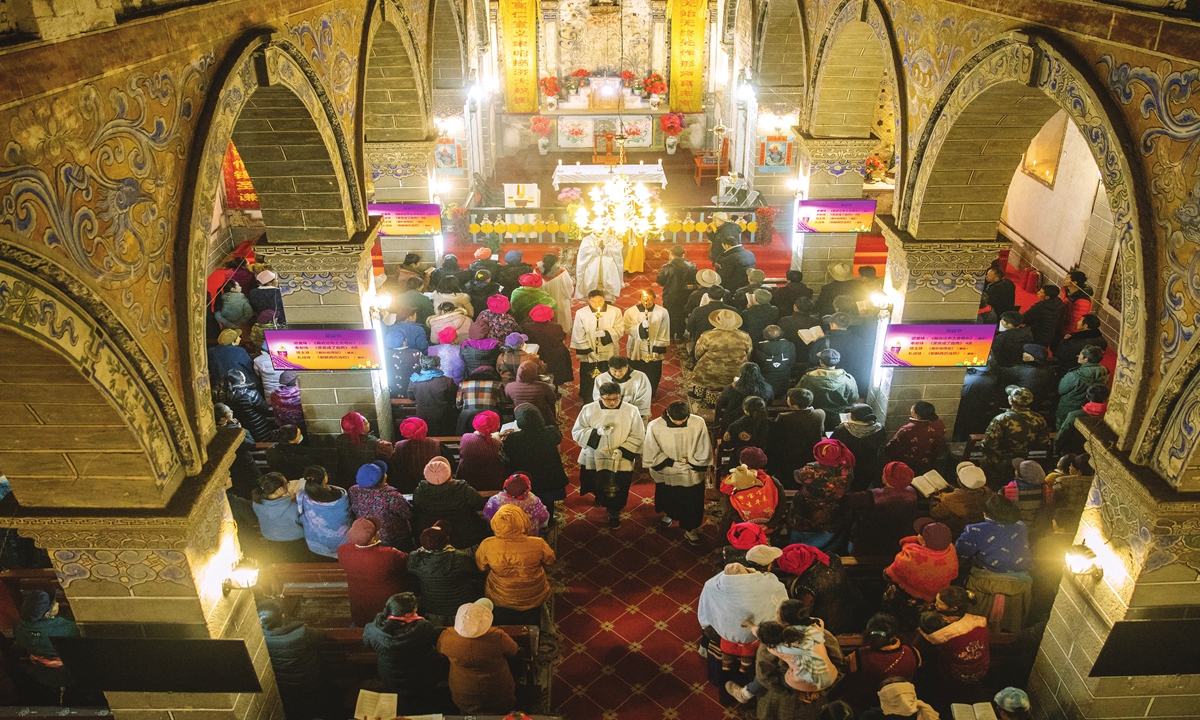US political forces under guise of religion serve as anti-China vanguard of Washington
By Huang Lanlan and Shan Jie Source: Global Times Published: 2020/10/27 1:22:08

A cathedral in Jinan, East China's Shandong Province. File Photo: IC
US Secretary of State Mike Pompeo's accusations of "religious persecution" in China, while touting the US commitment in promoting "international religious freedom," illustrate how the US uses religion to insert ideology globally and attempt political and social sabotage in other countries, Chinese observers pointed out.
It has been common to see US anti-China forces stand behind so-called nonprofit groups, like ChinaAid, smearing China's religious policies.
Chinese observers describe ChinaAid as a "cat's paw" of the US in realizing its conspiracy of politicizing religious matters in China. The group, which is religious on the surface, is actually a political movement that breaks local order and values, said Li Haidong, a professor at the Institute of International Relations of the China Foreign Affairs University.
"True religious groups will not interfere and blame other countries as their main job… therefore, ChinaAid is actually a political organization," Li told the Global Times on Monday.
Rooted in the US
ChinaAid seems to not mind its open connection with the US government. With its headquarters in Texas and an office in Washington, DC, this US-based group has been in close contact with US authorities since it was established in 2002 by anti-China pastor "Bob" Fu Xiqiu, who left China for the US in 1997.
In 2017, several US congressmen including Chris Smith attended ChinaAids' 15th anniversary celebration at the Library of Congress. The representatives openly called for a tough stance from the Trump administration against China on "human rights" issues, VOA reported in February 2017.
As ChinaAid showed on its website, the group works with an "advisory board" consisting of several US anti-China politicians and scholars, such as former US Representative Frank Wolf, who initiated the infamous "Wolf Clause" in 2011 to prohibit the US from cooperating with China in scientific space research and activities. Right-wing academic William Inboden, a former member of Strategic Planning on the National Security Council at the White House, is also on the list as a ChinaAid "advisor." Inboden has advocated "peaceful evolution," an extreme campaign to "peacefully" overthrow China's socialist system.
There are also "cooperative institutes" listed on ChinaAid's website, which are described as "partners that advocate religious freedom, human rights and rule of law in China."
The first on the list is the veteran anti-China foundation National Endowment for Democracy (NED).
Founded in 1983, the NED offers more than 1,600 grants each year to support projects of nongovernmental groups abroad that are working for so-called "democratic goals" in more than 90 countries and regions. Its funding mainly comes from the US Congress.
According to NED's own data, it spent more than $1.16 million in Hong Kong from 2016 to 2018. A majority of its sponsorships went to Solidarity Center and National Democratic Institute for International Affairs, which NED refers to as core grantees.
Freedom House, another partner of ChinaAid, was founded in 1941 to oppose communism in Europe. It works as a think tank for the US Department of Defense and is closely linked to the Bush family. Around 80 percent of its funds are from the US government and it works for US authorities, according to an article published in 2005 in a journal affiliated to China Institutes of Contemporary International Relations.
The Lantos Foundation, founded in 2008 named after former US congressman Thomas Lantos, is also active on anti-China issues in the name of religion and human rights and interferes in China's policies in Tibet and Xinjiang regions. In 2009, the foundation awarded its first "Lantos Human Rights Prize" to the Dalai Lama. The US Congress established the Tom Lantos Human Rights Commission in 1983. The Lantos family is also involved in the Falun Gong cult.
It is no surprise that anti-China forces in the US stand so close to ChinaAid, said a religious person who personally knows ChinaAid's Fu. "They exploit each other for their own separate advantages," said the man who preferred only to be called Wang.
ChinaAid makes a living in the US through anti-China activities, Wang said. It gains funds and donations from US government-backed foundations by picking on China's religious policies, he said.
"For Fu, attacking China is a job or a business that enables him to make money and survive in the US," Wang told the Global Times, saying that Fu could otherwise hardly establish himself there as an ordinary pastor.
The US government, on the other hand, also cooperates with groups like ChinaAid to subvert ideology and promote "Americanization" [in China] with their hands, Li said. "It is a characteristic of US diplomacy to work on human rights, ideology and values, and export those values by preaching," he said.

Villagers celebrate Christmas in Cizhong, Diqing Tibetan Autonomous Prefecture, Southwest China's Yunnan Province. Photo: Li Hao/GT
Usual tricks
Several Chinese scholars and government officials reached by the Global Times said that ChinaAid had long supported underground Christian churches in China and their illegal activities, which had severely threatened China's social stability and religious freedom.
In previous years, ChinaAid has been fostering and training its Chinese members outside the Chinese mainland, said Zhou Shan (pseudonym), a former grassroots-level official in East China's Zhejiang Province who dealt with religion-related issues for local residents.
Trained members built illegal Christian groups such as "house churches" following ChinaAid's directions, Zhou told the Global Times on Monday, recalling that these underground religious forces had infiltrated into small towns and villages in rural Zhejiang.
A usual trick that ChinaAid played in interfering and smearing China's religious policies is building up unregistered religious venues and organizing illegal activities, and then yelling "religious persecution" after the Chinese government prohibits these activities in accordance with law, Zhou said, pointing out that ChinaAid usually misled the public by intentionally misrepresenting China's ban on unlawful activities as a crackdown on religious freedom or human rights.
"It's neither factual nor logical, but quite catered to the taste of the Western anti-China forces," he sighed.
Similarly, the so-called investigation reports on China's religious situation that ChinaAid regularly releases are full of one-sided, exaggerated misinformation, including its clichés slandering China for "religious suppression" in Xinjiang Uygur Autonomous Region.
Xinjiang, in sharp contrast to what these political groups portray, has some 24,400 mosques, meaning a mosque for 530 Muslims on average - more than 10 times of that in the US. "China protects people's freedom of religious belief and it's okay to go to legally registered religious venues," Zhou said. "But anti-China groups like ChinaAid just turn a blind eye to that."
Exchanges on religions should be based on respecting differences and communicating equally, Li noted. "This is the principle of religion management of China to avoid religious organizations from other countries to interfere in the independence of religions in China, as well as ensure the country's sovereignty and people's normal daily life."
Zhang Yutong contributed to this story
Newspaper headline: State of faith
Posted in: SOCIETY